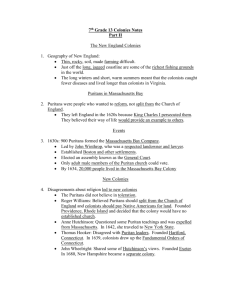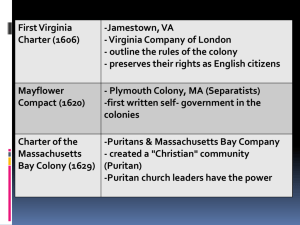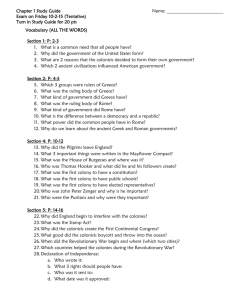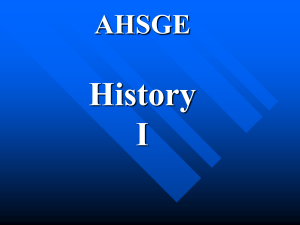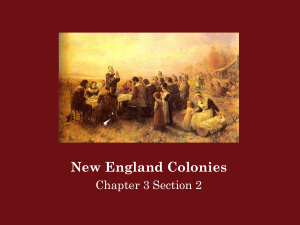Church of England - Hillsdale Public Schools
advertisement
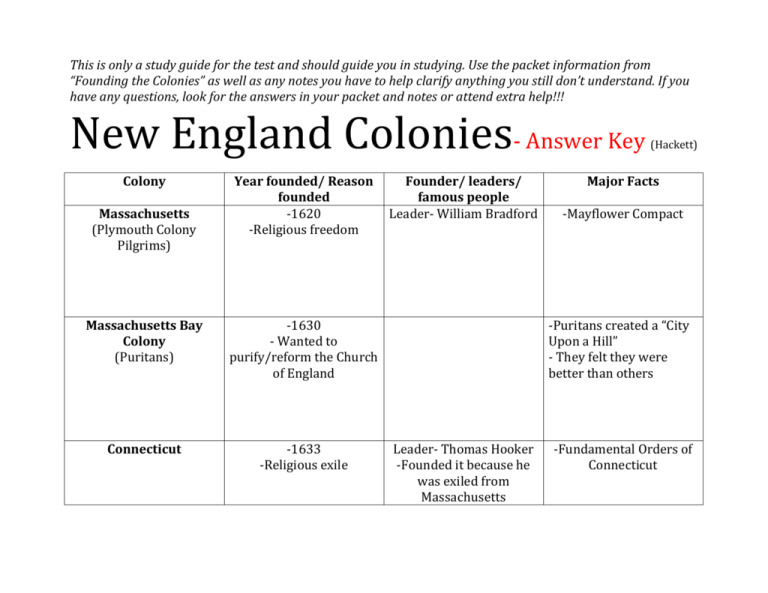
This is only a study guide for the test and should guide you in studying. Use the packet information from “Founding the Colonies” as well as any notes you have to help clarify anything you still don’t understand. If you have any questions, look for the answers in your packet and notes or attend extra help!!! New England Colonies- Answer Key Colony Massachusetts (Plymouth Colony Pilgrims) Year founded/ Reason founded -1620 -Religious freedom Massachusetts Bay Colony (Puritans) -1630 - Wanted to purify/reform the Church of England Connecticut -1633 -Religious exile Founder/ leaders/ famous people Leader- William Bradford (Hackett) Major Facts -Mayflower Compact -Puritans created a “City Upon a Hill” - They felt they were better than others Leader- Thomas Hooker -Founded it because he was exiled from Massachusetts -Fundamental Orders of Connecticut Rhode Island -1636 -Religious freedom from Puritans Leader- Roger Williams -Founded it when he was exiled from Massachusetts because he wanted religious freedom - This colony gave full religious freedom to all New Hampshire -1623 Leaders- John Mason (from NH) -Sir Gorges (from Maine) -Huge fishing and ship building colony Climate/ landforms/ geography *New England Colonies (Massachusetts, Connecticut, Rhode Island, and New Hampshire)- poor for farming due to many rocks. Most colonists were involved with fishing, shipbuilding, and shipping products to and from England out of multiple harbors because of the major waterways in New England. * Middle Colonies (New York, Delaware, New Jersey, and Pennsylvania)- most colonists owned small farms, aside from a few rich landowners in NY and NJ. These colonies interacted with the most powerful Native American tribe- the Iroquois. * Southern Colonies (Virginia, Maryland, Georgia, North Carolina, and South Carolina)- full of large plantations run by wealthy landowners. Many crops were grown (tobacco, rice, wheat, and indigo), which were exported back to England. Slave labor became the major way plantations grew and harvested crops. Government *Crime and punishment- most punishments were shameful/embarrassing and physically painful. Some punishments were the stocks, the pillory, the ducking stool, whipping, and branding letters into the skin. *Government models: The Mayflower Compact, the Fundamental Orders of Connecticut, the General Court, and New England town meetings all shaped the government we have today. All of those forms of government gave power to the people, encouraged involvement of colonists, and prevented one person from having complete control. We use similar practices in our government today. *For extra studying- make sure you know what each governmental model did!* New England Key Terms- Answer Key 1. 2. 3. 4. 5. 6. Mayflower Compact- agreement made aboard the Mayflower a. Set up a government b. Picked leaders c. Make and follow laws Pilgrims- Settlers of Plymouth Bay Colony who were fleeing persecution Established Church- Church of England; government established religion (you had to follow that religion or you couldn’t live there); head of the Church was king. Persecuted- When you are punished for your beliefs. This is why people wanted to escape their homeland and head towards the colonies. They were being persecuted for certain beliefs. Separatists- Another name for pilgrims separating from the Church of England. Puritans- Religious group who wanted to reform the Church of England. They founded Massachusetts and created a “City Upon a Hill.” 7. 8. 9. 10. 11. 12. 13. 14. 15. Reform- To change or make better. People settled in the colonies and reformed the government and religion. Church of England- Mandated religion of England (the religion people were forced to follow in England). City Upon a Hill- The land where the Puritans settled. They designed the city on a hill because they felt better than anyone else. (Think about Emerald City). Charter- A legal document that allows you to start a business. Banish- To send away permanently Fundamental Orders of CT- The laws Hooker created when he founded Connecticut. Ship building- An extremely important aspect of Colonial life because the fastest way to get from one place to another was by water. Britain benefitted from lumber found in the Colonies because the British required large amounts of wood to build ships, which they needed in order to trade goods. Meetinghouse- A building typically used for worship and public assembly King Philip’s War- Metacom, called Philip by colonists, was a Wampanog leader who led his tribe against the colonists and attacked more than 50 towns. He was fighting against the colonists because they were taking his land. He was defeated and killed, and many of his remaining tribesmen were sold into slavery, and hostility between Native Americans and colonists increased. Happy studying!
